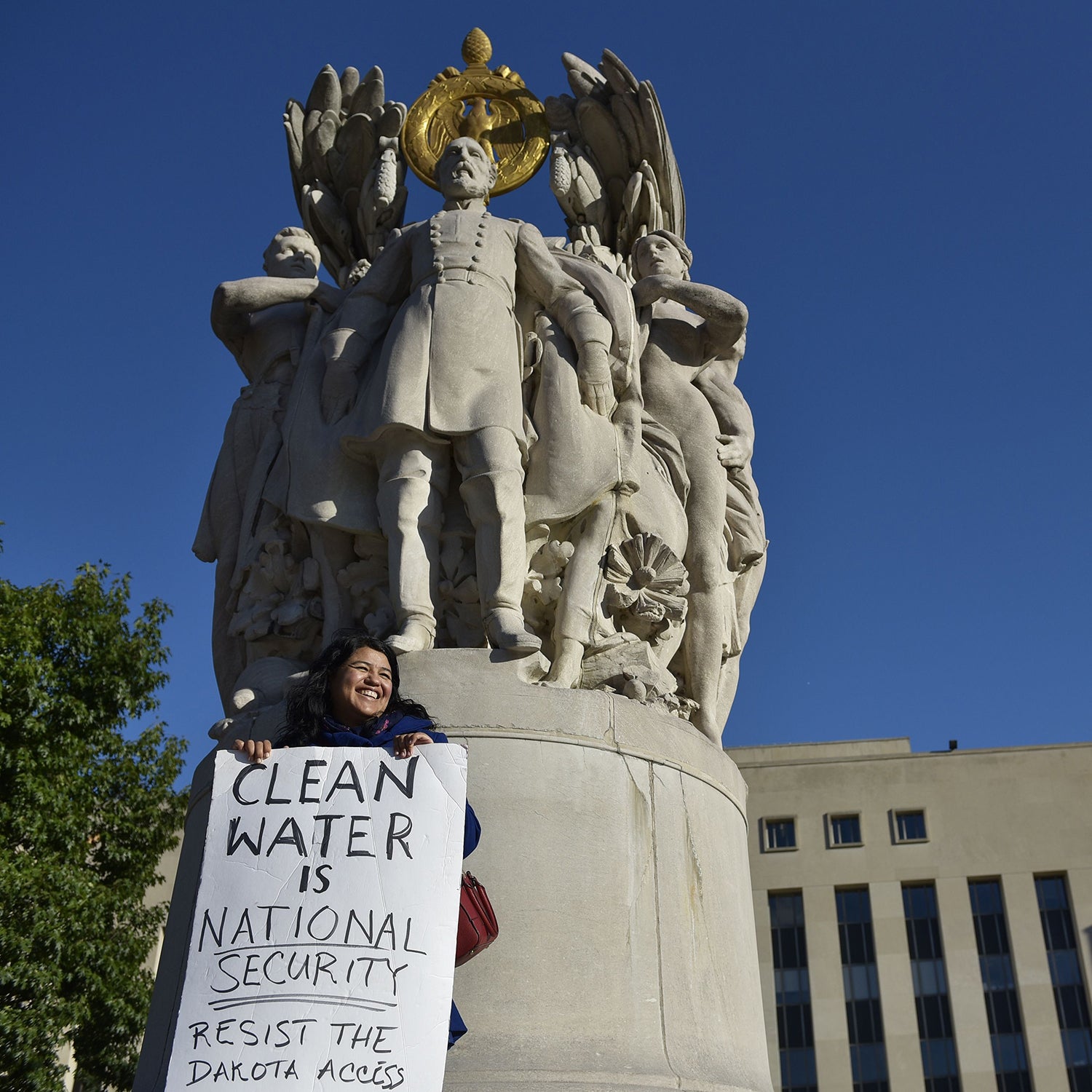In his first 11 days of office, Donald Trump issued , ranging from building a border wall to approving the Dakota Access and Keystone pipelines to ending new federal regulations. The half-dozen lawyers I talked with in recent weeks about environmental law under Trump all doubted the administration’s ability to undermine existing regulations solely with executive actions. But more than just political theater, Trump’s wet ink broadcast the administration’s big-league ambitions for the next four years. For already twitchy environmental groups, the five executive actions dealing directly with energy and environmental regulations raised the anxiety level from slightly concerned to full-on emergency.
A quick refresher on our three branches of government: Congress writes laws, the president enacts or vetoes them, and courts enforce them. What spooks environmental groups more than Trump’s executive orders is the threat of Congress pulling laws off the books. The Republican-controlled House has demonstrated its willingness to fast-track legislation, but the Republican majority in the Senate is slimmer, meaning that bills are more prone to filibustering or outright defeat. That could be especially true given Senator John McCain and Lindsay Graham’s of resisting Trump on the ban on immigrants from seven Muslim-majority countries. William Snape, senior counsel at the Center for Biological Diversity and a teacher at American University’s Washington College of Law, thinks the earliest we’ll see Congress try to rewrite the Endangered Species Act or the Clean Air Act is March 4, when the feds run out of money, and Congress members tend to attach environmental riders to necessary appropriations bills.
“Will Trump be able to get rid of key provisions in the Clean Water Act? The Endangered Species Act? It all boils down to the strength of the Democratic filibuster in the Senate,” says Ralph Bloemers, of Oregon’s Crag Law Center, which recently won a case blocking a coal export terminal along the Columbia River. “We only go to court if there’s a dispute over laws on the books. If Congress changes that law, there’s no lawsuit.”
For the time being, all our existing protections remain on the books. That keeps the fight where environmental organizations are best equipped to defend or push policies: court. The Supreme Court earned its moniker because, unlike the 107 other lesser federal courts, its rulings set precedent for any and all cases involving federal law. But it's only one court. Each year the justices receive about 7,000 requests to field cases; just 130 make it through the door. That leaves many thousands of very important environmental lawsuits—everything from agency overreach to the legality of an international pipeline—to be decided by courts that don't reign supreme.
Of those, the D.C. Circuit may be the most important. Housed in a classical courthouse on Constitution Avenue, the D.C. Circuit plays an outsized role in shaping policies because it reviews the rules of all agencies based in the capitol. The court's eleven justices—conservative or liberal—share a reputation for extreme legal competence best personified by Merrick Garland, the Obama Supreme Court nominee whom Republicans . That hasn’t historically translated to sympathy for environmental causes. Though Obama appointed four new justices to the court, giving Democratic-appointed judges a seven-to-four edge, Snape wouldn't describe any of the judges as liberal. “I’ve won before Garland, and I’ve lost before Garland,” he says. Garland has a deep respect for the system, and like John Roberts, chief justice of the Supreme Court, he views himself as a protector against extremism. “I expect you’ll see this court assert themselves if Trump goes too far,” Snape says.
For the time being, all our existing protections remain on the books. That keeps the fight where environmental organizations are best equipped to defend or push policies: court.
Over the next four years, the D.C. Circuit is where environmental organizations will argue any potential challenges to the Forest Service, Bureau of Land Management, Park Service, and Fish and Wildlife Service. It’s also where we’re likely to see Trump’s come to a head. Without money to enforce laws, citizens and environmental organizations will file suits against the EPA for failing to do its job. In a bit of irony that liberals will love, those cases could well end up on Merrick Garland’s desk.
A good case to watch for the temperament of the D.C. Circuit under the Trump administration is over the Clean Power Plan. The rule, an Obama-era interpretation of the Clean Air Act, gives the EPA authority to regulate greenhouse gases. It has never been on firm legal footing. After the Supreme Court stayed the rule in February 2016, a coalition of states and fossil-fuel businesses argued before the D.C. Circuit that the act gives the federal government too much power to enforce state laws. They’re expected to issue a judgment anytime in the next few months. Whatever they decide, Snape says it will have “massive political ramifications.”
For one thing, the case is a bellwether for the D.C. Circuit’s leaning on exactly the type of procedural case that tends to steer policy. “Whoever votes which way on the Clean Power Plan will be a good indication of how they’ll vote on a lot of cases,” says Snape. It could also tell us how the Trump administration reacts to a judicial blow.
Even if the court affirms the rule, Trump has said he intends to repeal it, along with of our government’s 90,000 federal regulations. Doing so won’t be easy. “Just as you tied the shoelace, you’ve got to untie it, following the same administrative processes that put the law there in the first place,” says Snape. The Clean Power Plan has been in court for more than a year now. In some cases, undoing the rules may not even be legal. When George W. Bush took the Oval Office, he tried to redirect many of the agencies by undoing former President Bill Clinton’s executive orders. “They had a terrible track record defending those changes in court,” says Seth Jaffe, a partner at Boston’s Foley Hoag law firm and an expert on the Clean Air and Clean Water Acts. “Agencies can’t just change their minds and assume the courts will bless it.”
Of course, the lawyers’ comfort in checks and balances assumes Trump plays by the rule of law. The careful wording of the executive orders for the and pipelines suggests he will. So does the Supreme Court nomination of Neil Gorsuch, an originalist unlikely to blanch at checking executive power. But the carelessness of Trump’s immigration order, which a federal judge blocked parts of on Saturday and many conservatives have lambasted in the media, hints that our president is willing to test the law’s limits.
“We’re in a brave new world,” says Jaffe. He referenced , when the Supreme Court ruled that Georgia had no rights to enforce state laws on Cherokee lands. President Andrew Jackson mocked the court’s inability to enforce its own rules, and then sent the Cherokees marching down a route known as the Trail of Tears. “I have no idea if that’s the world we’re living in,” Jaffe says. “But presidents have ignored courts before.”
Barring that grim scenario, Congress and Trump’s wish to make their conservative agenda legally binding faces the same bureaucratic grind that slowed Obama’s progressive vision. Which, in the case of environmental regulations, may be a good thing.


